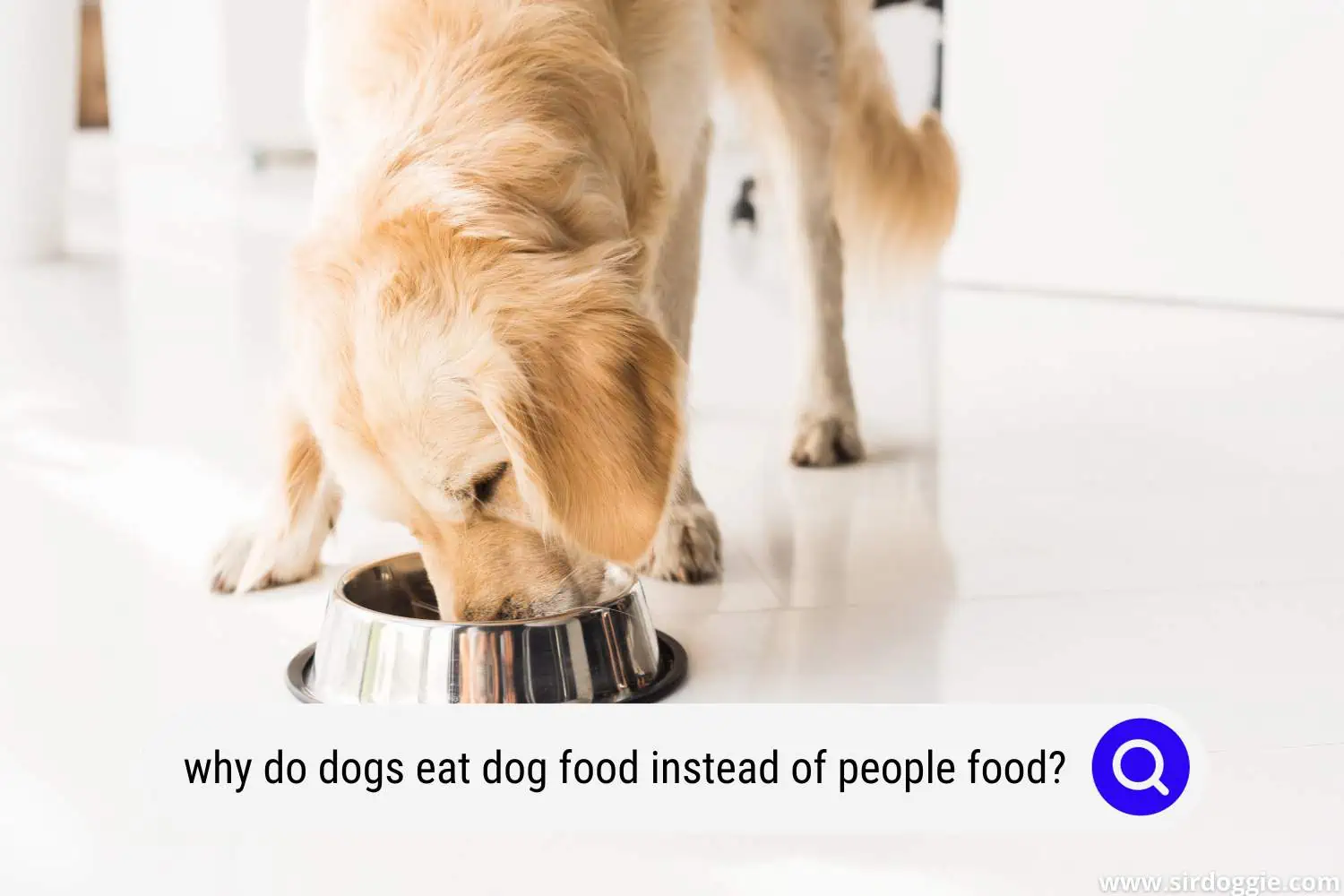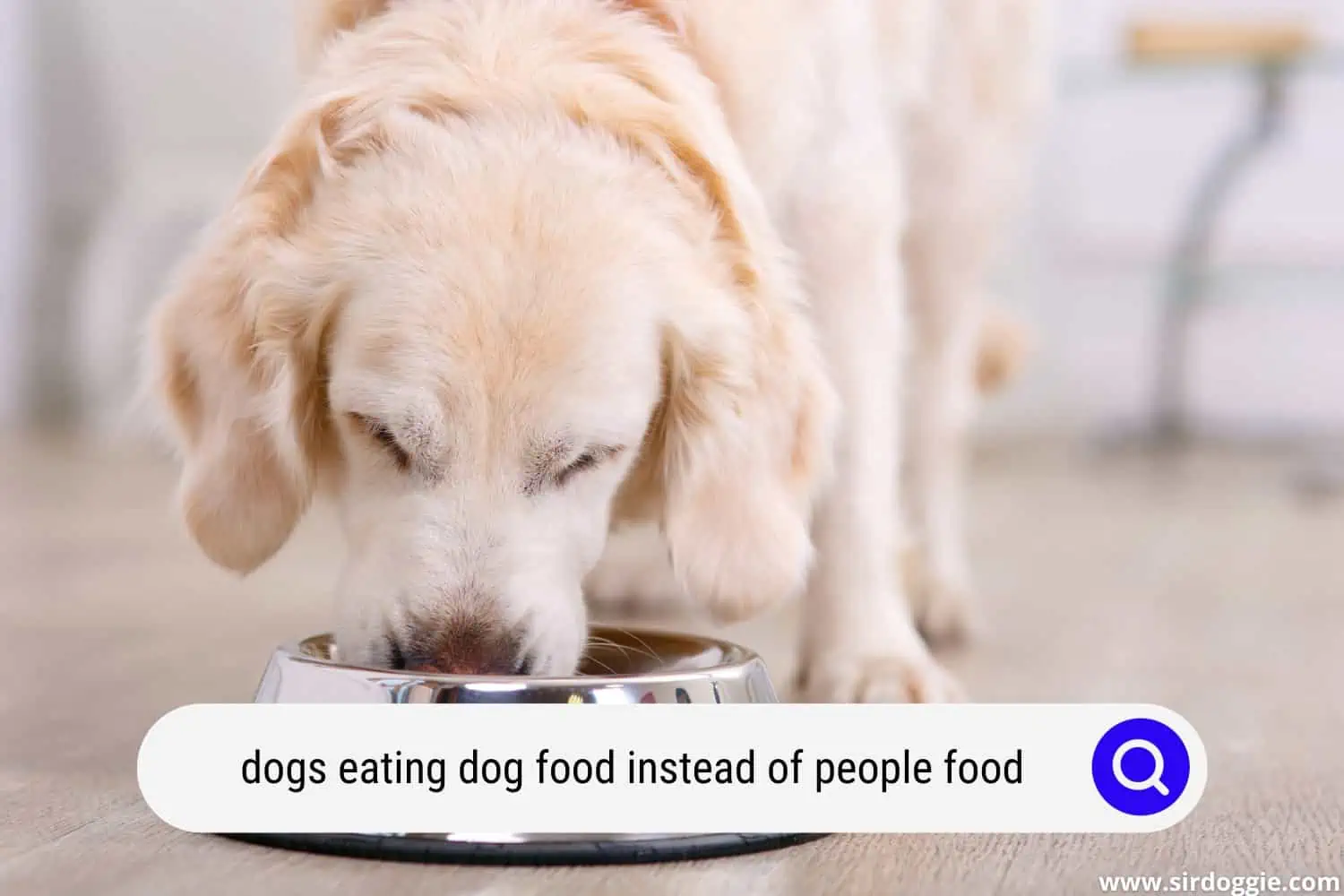Why Do Dogs Eat Dog Food Instead of People Food?
If you are a dog owner, chances are you have shared part of a meal with your best friend at one time or another. It might be hard for you to take that first bite without your dog sitting quietly, with those big eyes, begging for just a little bite. It’s understandable that dogs like people’s food, after all, dogs and humans have been together for thousands of years, and it’s natural for us to share a nibble with our canine companions.

That brings us to the question: Why do dogs eat dog food instead of people’s food? The answer is that dogs have specific dietary needs, and people’s food does not always provide them with the nutrients that they need to keep healthy and happy. While dogs can eat a lot of different foods that we eat, there are several essential vitamins and nutrients that dogs should get from their diet. Also, dog food is a convenient option for most pet owners.
Why Do Dogs Eat Dog Food Instead of People’s Food?
Dogs and humans have been living together for thousands of years, and obviously, dogs were not always fed commercial dog foods. But that’s not to say that humans never paid attention to what they fed their furry friends.
The Roman poet and philosopher Marcus Terentius Varro authored a book on farming in nutrition and recommended feeding dogs meat and bones, and barley soaked in milk. During the 19th Century in Europe, most dogs ate what their owners ate, such as cabbage, potatoes, crusts or bread, or other table scraps.
It wasn’t until 1890 that the first commercial dog food was developed by James Spratt, a British entrepreneur who after seeing dogs being fed leftover biscuits from a ship got an idea. He formulated the first dog biscuit: a mix of vegetables, wheat meals, beetroot, and beef blood, and it was a big hit among sporting dog owners.
In 1922 in the US, the first canned dog food was developed by the Ken-L Ration company. However, its main ingredient was horsemeat, which was considered an acceptable ingredient source at the time.
The science of veterinary nutrition emerged in the late 1800s, and our understanding of animal science and nutrition also continued to evolve throughout the 20th Century. The first pet food specifically formulated for the unique nutritional needs of puppies was introduced in the early 1960s.
In the mid-1980s, the U.S. National Academy of Sciences’ National Research Council published nutritional requirements for both dogs and cats. These days most commercially prepared U.S. pet food is now formulated to be “complete and balanced,” meaning that it provides all of a pet’s nutritional requirements at the correct levels.
Although these days some dog owners may prepare their pet’s food from scratch, or feed a raw diet, others opt for the convenience of commercially formulated diets. If you have ever cooked for your dog, you know that it can be time-consuming in comparison to opening a bag or a can of dog food and offering it to your pet.
With the evolution of the dog food industry and the almost limitless choices for dog owners, the reason that dogs eat dog food rather than people’s food is that it’s more convenient, and owners can rest assured that their furry friends are getting the nutrition their bodies need.
What Nutrients Does My Dog Need?
Like humans, dogs require certain nutrients, vitamins, and minerals in their diet. The FDA (Federal Drug Administration) requires that all veterinary diets and commercial diets contain proper nutritional ingredients. These ingredients are listed below.
- Proteins
Proteins are the building blocks of life, and a dog’s body can make 13 of the 23 essential amino acids, but the other 10 need to come from the diet. Proteins in dog foods come in the form of meats or plant proteins.
- Fats
Fats provide energy and also help to keep your dog’s hair and skin healthy. A dog’s body cannot make enough essential fatty acids (the building blocks of fats), and need to obtain the following fatty acids from their diet:- Omega-6
- Linoleic acid
- Omega-3
- Carbohydrates
Carbohydrates are another essential nutrient for dogs. Carbohydrates are the chief source of energy and help to fuel the brain, kidneys, muscles, and central nervous system. Most carbohydrates come from plants, and dogs require the following carbohydrates:- Starches
- Sugars
- Fiber
- Vitamins and Minerals
Vitamins and minerals are needed for your dog’s bodily chemical reactions and also help to build strong building bones. A balanced diet includes one that provides the following vitamins and minerals:- Calcium
- Phosphorus
- Vitamin D
- Vitamin A
- Vitamin E
- Vitamin K
- B-complex
Interesting note: Vitamin C is not needed for dogs because their body makes enough of this essential nutrient.
If your dog is on a balanced diet, your dog won’t need additional vitamins or supplements. If you are wondering about supplements, consult your veterinarian first. In some cases giving your dog vitamin supplements can be detrimental.
- Water
Like all animals, water is vital to the health and well-being of your dog. Water makes up more than half of an adult dog’s body weight, and although canned dog food may have a lot of water in it, it’s not enough for your dog. It’s always important to provide your dog with clean, fresh water at all times.
What foods can’t dogs eat?
There are a lot of human foods that you can feed your dog without causing GI (gastrointestinal) or health side effects, but there are foods that you should never feed your dog. If you think that your dog has ingested any of the following foods, contact your veterinarian immediately. You can also call the Pet Poison Helpline at (855) 764-7661, or the ASPCA Animal Poison Control Center at (888) 426-4435.
Coffee. If your best friend happens to have a taste of your coffee, there is no reason to worry, however, be aware that coffee is toxic to dogs. The caffeine in coffee can cause cardiac arrhythmias, vomiting, and panting.
Chocolate. Chocolate is toxic to dogs, and depending on how much is ingested, and whether or not it is dark chocolate or milk chocolate, it can result in significant illness. Chocolate contains a chemical called theobromine, as well as caffeine, which dogs cannot metabolize. If you think that your dog has ingested chocolate, contact your veterinarian immediately.
Macadamia nuts. Macadamia nuts can also be toxic to dogs. Dogs who have ingested these nuts can experience weakness in the back legs, vomiting, and diarrhea. It only takes a dose of about two nuts per pound of body weight to result in poisoning, leading to a temporary inability to walk.
Soft drinks. Soda and soft drinks can contain caffeine, sugar, as well as artificial sweeteners. While a little sip likely won’t hurt your dog, sharing a soda with your furry friend can elevate his blood sugar as well as expose him to caffeine toxicity.
Avocados. Avocados contain a chemical called persin, a fungicidal toxin, which can cause toxic side effects and even death in dogs. Although dogs are more resistant to this chemical than other animals, it’s best to keep avocados out of reach of your pet.
Xylitol. Xylitol is an artificial sweetener found in several food products such as chewing gum and other sugar-free foods. Xylitol is extremely toxic to dogs, and even a small amount can cause hypoglycemia (low blood sugar), liver failure, seizures, and even death.
Grapes and raisins. These popular foods are also highly toxic to dogs, though research is unclear as to the direct cause. In some dogs, grape and raisin ingestion can be fatal, leading to sudden kidney failure.
Yeast dough. If a dog gets into rising bread dough, this can cause a medical emergency, possible bloating, and alcohol toxicosis.
Onions. Onions contain a toxin called N-propyl disulfide which is known to destroy red blood cells in dogs, resulting in anemia (a low red blood cell count). They also contain a substance called thiosulfate which dogs cannot digest, leading to possible toxicosis.
Garlic. Garlic, part of the leek, onion, and chive family, is also poisonous to dogs and is much more potent than onions. While owners shouldn’t be worried about small amounts if ingested, large amounts can be very toxic to dogs.

Final Thoughts
Although humans have been sharing meals with dogs for thousands of years, these days most dog owners choose to feed their best friends commercially-prepared pet foods because it’s more convenient, and these foods are guaranteed to provide all of your dog’s dietary needs. The pet food industry in the US generated $99 billion last year, and manufacturers offer pet owners hundreds of diet choices for their dogs. Although it’s perfectly fine to feed your dog people food or home-cooked meals, make sure that you check with your veterinarian first to ensure that your best friend is getting the nutrients he needs.

Family Dog Expert Author
Hi there! I’m Stuart, a devoted dog lover and family dog expert with over a decade of experience working with our furry companions. My passion for dogs drives me to share my knowledge and expertise, helping families build strong, loving bonds with their four-legged friends. When I’m not writing for SirDoggie, you’ll find me hiking, playing with my beautiful dog, or studying music.